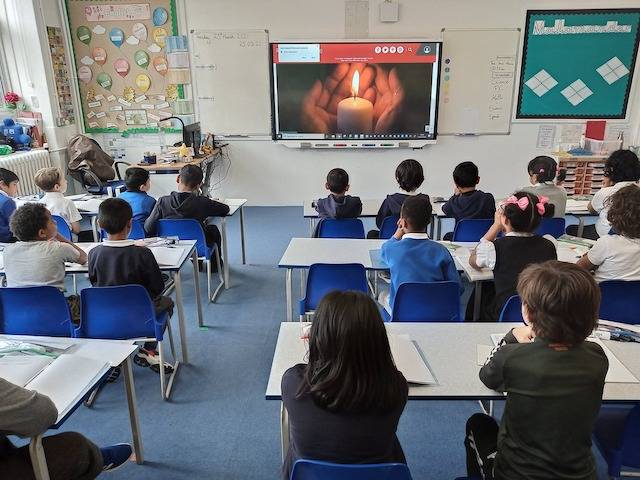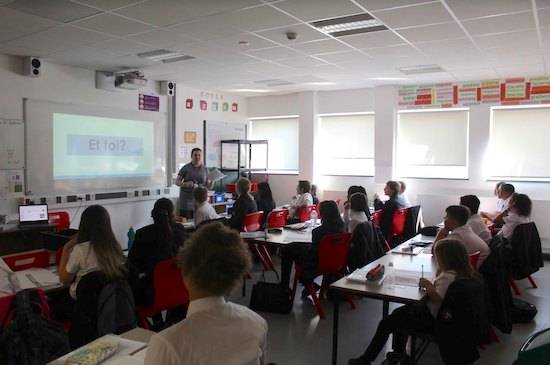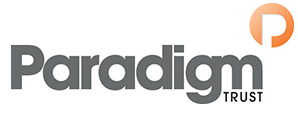How Paradigm is placing subject knowledge at the heart of Religious Education
An extensive Ofsted report on Religious Education, released in May 2021, has identified that nationally RE teachers’ subject knowledge is weak. Fewer than a third of the 633 trainee secondary RE teachers in this academic year have a degree in Theology or Religious Studies, and during PGCE training, on average only a day or two is given over to RE. For a subject which is heavily knowledge-based this is far from ideal, so at Paradigm measures have been in place for several years to make sure teachers have the knowledge and support they need to teach RE effectively.

One of the main ways Paradigm ensures its RE teachers have an appropriate level of expertise is by providing subject knowledge enhancement. Before each topic is started, teachers in each year group from across the Trust will meet together to go through the plan and talk about all the misconceptions that might surface around it. The RE lead for that year group then goes through the core knowledge required for that topic to ensure everything is covered, and there is a quiz at the end of it to see whether there are any remaining gaps that need to be filled before teaching begins.
Another tool used by Paradigm is the bonanza day, a big event consisting of workshops on different areas of subject knowledge. Teachers from across the Trust come together and are able to pick and choose which workshops they attend, so they can address any areas where they feel they are lacking knowledge and get the training they need. For example, at a recent bonanza there were workshops on Judaism and one on how to use artefacts in the classroom.
At every school there is an RE lead at each school whose duties include visiting the classrooms and getting involved in lessons, modelling effective practice and providing constructive feedback. Paradigm also encourages teachers to record their lessons, so they can be watched back and gone through with the RE lead or other peer, allowing them to see the positive aspects and identify areas for improvement.
As Religious Education has no statutory curriculum, Paradigm has developed its current curriculum by taking the best parts of the Tower Hamlets syllabus and the Suffolk syllabus (the two authorities which Paradigm schools fall under) and combining them in a way which reflects the Trust’s ethos and values.
RE is taught systematically, so each child studies each chosen religion – Christianity, Hinduism, Humanism, Islam, Judaism and Sikhism – twice in their primary career, first establishing their initial knowledge, then building on what they’ve learnt when they revisit it later (Buddhism is added at KS3). To ensure the children make progress there is a different focus enquiry in each year. For example Year 2 will look at how and why the religions celebrate festivals, when they reach Year 5 they will explore what it means to follow a certain religion in Britain today. This way there is no repetition when children revisit the religion.
By structuring the curriculum in this way, teachers can be confident about the learning in previous years, and they have good subject knowledge too. There is a consistency so they know what the children have been taught previously, and this allows the teachers to make comparisons between religions for the children and themselves. It also facilitates spaced practice.
Paradigm takes a ‘whole school’ approach to teaching religion; every year group from 1-6 will study the same religion at the same time. This has several benefits, the first being it evokes a community sense in the whole school. By learning the same subject at the same time, siblings from different year groups will be able to discuss the same issues at home, albeit at different depths. When festivals come around the entire school can take part in the celebrations.
This approach is not only effective for learning, it also allows for greater efficiency when it comes to staff training and the organisation of resources and visits. RE is a very artefact-rich subject and teachers always bring in items from the religion, such as Bibles, kippahs and patkas, to enrich the children’s learning.
Another useful teaching tool which is used in Year 1 is a persona doll, which teachers use with the children every time a new religion is introduced. The doll brings with it a bag in which it has all the relevant artefacts, as well as other things such as a toy car or colouring pens. The doll becomes a member of the class for the time they are learning RE, and is brought in every lesson so the children can relate to it, and the teacher can use it as a frame of reference, asking questions such as ‘this doll is going to church, what might we do if we went with her?’.
The Trust arranges for external parties to come in and run workshops on different religions, and this works far more effectively when the whole school is studying the same religion simultaneously. The children also go out and experience religion in their community by taking a visit to a different place of worship every year, so in their primary career they will have experienced a workshop on every religion, and visited every place of worship too.
In present day society religion and beliefs have become more visible in public life locally, nationally and internationally. Religious education allows Paradigm particular opportunities to promote an ethos of respect for others, challenge stereotypes and build an understanding of other cultures and beliefs. This contributes to promoting a positive and inclusive school ethos that champions democratic values and human rights. It provokes challenging questions, encouraging pupils to explore their own beliefs, enabling pupils to develop respect and understanding for others and finally it prompts pupils to consider their rights and responsibilities to society, and helps them understand themselves. RE supports all three Paradigm values of integrity, excellence and community.
Expert in Languages
By focusing on mastering the basics of foreign languages Paradigm Trust is achieving excellent progress figures and giving its pupils the foundation they need to succeed in the future.
Paradigm’s approach to teaching modern foreign languages focuses heavily on the spiral curriculum method, rather than covering a wide range of subjects and topics in little depth. By revisiting the same grammatical structures again and again, teachers embed the linguistic foundations which students need to fully comprehend so they can successfully progress in their understanding of the language. So in the current curriculum for example, the present tense is studied several times in Year 7, until teachers are confident the pupils understand the concept and know what they’re doing. Once they reach this point then teachers will add more in, but again keep revisiting the concepts in different topics so the students continue to grow in confidence. By doing this, pupils are able to gain mastery of these vital foundation building blocks.

As with all subjects across Paradigm, a lot of focus is placed on retrieval practice. Throughout the year teachers revisit what has been taught and check that pupils have understood it and can recall that information. This can take many forms, such as low stakes tests and spaced practice, so students see those same things again and again but in different contexts, to ensure they really understand what they’re talking about and that the solid foundations are there.
Learning foreign languages isn’t only for secondary school students; Paradigm has a keen focus on teaching languages in its primary schools too. Nationally this is traditionally seen as a challenge; firstly because there is a shortage of teachers at that stage with the skills or experience to teach a foreign language – many primary schools don’t have a specialist foreign languages teacher at all. Secondly, establishing time for foreign languages in the curriculum can also be an issue, as other subjects may take priority.
To overcome these challenges, Paradigm employs a specialist languages teacher for its London primary schools, who splits her time between Solebay Primary, Old Ford Primary and Culloden Primary. This way the children at all three schools can benefit from specialist teaching at a stage where they would normally not receive any. It also puts them in an advantageous position when they make the transition to secondary school and start studying foreign languages in more depth.
In Ipswich, Paradigm employs a different strategy, with both its primary academies, Murrayfield and Piper’s Vale, using a carefully selected bought-in scheme which has been chosen as it closely mirrors the London school’s programmes, and fits well with the Paradigm pedagogy.
When it comes to choosing what language is taught in its primary schools, Paradigm ensures it is one that correlates with what is being taught in the local secondary school. Currently this means the London schools learn Spanish as that is the language which is predominantly taught in the surrounding secondary schools, while in Ipswich, Murrayfield and Piper’s Vale teach French, the main language learnt at Ipswich Academy.
At both primary and secondary school Paradigm is careful to use examples which show people around the world who speak French and Spanish, not just in their home countries. In this way children get a greater understanding and appreciation of different cultures and how language spreads around the world.
The ability to speak a modern foreign language is more beneficial now than it has been for a generation. In terms of business links and employability, the skill is highly in demand – recent events mean that as a nation we will be trading directly with more countries than before, and the ability to communicate effectively, and understand the culture, will be invaluable.
The demand for foreign language speakers isn’t restricted to the business and trade sectors either. Many public organisations such as the NHS and the police require employees with linguistic skills, as do private companies in a range of industries from construction to accounting and finance.
The comparative scarcity of bilingual and multilingual speakers in this country is reflected in the wages on offer for positions which require these skills. A recent study by Preply found that people with Arabic as a second language can earn as much as 74% extra, compared to the average UK salary, with Mandarin increasing wages by 45%, and French by 34%. While it is impossible to teach every language, studies have proven once someone has learned one foreign language, they can pick up further languages more quickly.
Learning another foreign language also develops a range of transferrable skills, such as communication and presentation abilities. It also builds understanding and appreciation of other cultures, which are really important qualities in today’s society, and when dealing with other nations.
The success of remote working during the pandemic has opened another window for foreign language speakers. Over the last year and a half many businesses across the globe have discovered and embraced the benefits of remote working. This means people are no longer restricted by their physical location when it comes to building a career. Instead they can seek employment with firms around the world without having to move – and people who are able to speak foreign languages will have an important advantage.
The Department for Education is currently considering amending the subject content requirements for GCSE modern foreign language qualifications. The proposed changes involve a greater focus on stripping back the amount that is taught, a similar approach to how Paradigm already teaches foreign languages. There will also be more emphasis on teaching phonics, which is another area Paradigm has looked at – it adjusted the curriculum to do this in September 2020, and continues to embed it.
By focusing on what works, Paradigm is ensuring its pupils are making great progress in foreign languages – in 2018 the progress score was 0.89, and in 2019 it was 1.10. Using a process of continual feedback and review the Trust can make sure its pupils are being taught languages in the most effective way and will be able to take full advantage of the opportunities arising for foreign language speakers.
Incredible Violin performances from pupils at our London Schools
Pupils at our London schools have showcased everything they’ve worked hard to learn about playing the violin with some beautiful performances. Follow the links below to see them in action.
Culloden Primary Academy: Click Here
Old Ford Primary Academy: Click Here
Solebay Primary Academy: Click Here
